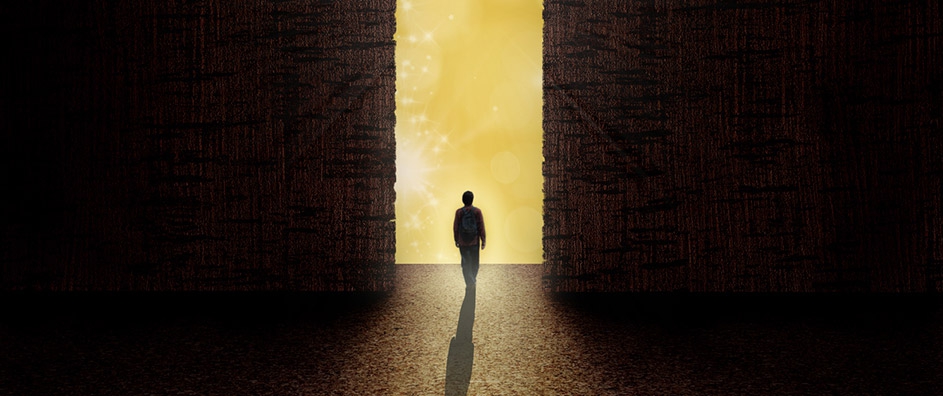The views expressed in our content reflect individual perspectives and do not represent the authoritative views of the Baha'i Faith.
To have his path made clear for him is the aspiration of every human being in this clouded and tempestuous existence. – Joseph Conrad
The human spirit, the Baha’i teachings say, has unlimited freedom. We each decide how to develop our own intellect, our consciousness, our spiritual reality.
… every human being is limited through his physical body, but his spirit is free. The body of man may travel for a few miles and become fatigued, but the spirit untrammeled may go throughout the immensity of space. While walking on earth man’s thoughts may grasp the motions of the heavenly bodies and define their course. This demonstrates how man’s spirit transcends his environment. – Abdu’l-Baha, Divine Philosophy, p. 168.
So if our spirit transcends our environment, how do we direct it? What factors into the spiritual decisions we make? Where do we go with our transcendent spiritual freedom?
We take the seeker’s path, that age-old, eternal trail, walked by many, many seekers in the past. To travel the seeker’s path means diligently searching for lasting principles, eternal truths, and the spiritual self. Making your way down this path produces insight, enlightenment and awakening. In the East, the seeker’s path most often leads to finding yourself; and in the West, it generally focuses on finding your purpose. But those goals overlap so profoundly that they can become one and the same for a sincere spiritual seeker.
You could call this quest the expansion of consciousness, the path of spiritual growth or the search for meaning in life, but Baha’u’llah’s beautiful phrase says anyone who walks this path must:
… seek at every moment to journey from the plane of heedlessness into the realm of being. – Baha’u’llah, The Seven Valleys, p. 5.

Bust of Plato
You’ve probably heard that phrase—the realm of being—before. It refers to Plato, who developed a view of reality that includes two “layers”—the world of Becoming and the world of Being. Plato called this ever-changing physical existence “the world of Becoming,” which we perceive through the senses—always in movement, always growing and always changing.
He called the higher, transcendent “world of Being” the place of ideas, of spiritual reality, of ideal “forms”—absolute, independent, transcendent, and unchanging. Those ideas and ideals, Plato believed, cause and create the lower reality, the world of Becoming. In his Symposium, Plato described how human beings could traverse the seeker’s path and move, through the most mysterious and powerful medium of love, to the realm of Being, an intuitive and mystical state of consciousness.
We humans can uniquely achieve that state of consciousness, Plato said, because we have a dual nature—we exist in the material world, but our souls have the potential to transcend it and live into a more divine existence in the eternal realm of Being.
The Baha’i teachings confirm that Platonic ideal of the dual nature of humanity:
It is evident, therefore, that man is dual in aspect: as an animal he is subject to nature, but in his spiritual or conscious being he transcends the world of material existence. His spiritual powers, being nobler and higher, possess virtues of which nature intrinsically has no evidence; therefore, they triumph over natural conditions. These ideal virtues or powers in man surpass or surround nature, comprehend natural laws and phenomena, penetrate the mysteries of the unknown and invisible and bring them forth into the realm of the known and visible. – Abdu’l-Baha, The Promulgation of Universal Peace, p. 81.
Many of us think we already exist in the realm of being—but that’s not possible until we begin to transcend the realm of becoming, otherwise known as this temporary material existence. Every spiritual path eventually leads to that single goal: transcendence. It requires the recognition of a higher realm, the desire to go there and the spiritual effort and practice it takes to follow our hearts:
O Son of Worldliness! Pleasant is the realm of being, wert thou to attain thereto; glorious is the domain of eternity, shouldst thou pass beyond the world of mortality; sweet is the holy ecstasy if thou drinkest of the mystic chalice … – Baha’u’llah, The Hidden Words, p. 46.
Sooner or later, of course, we all inevitably leave this “realm of becoming.” When death arrives, our souls take the journey on the spiritual path to the realm of Being, no matter what. We depart from the plane of heedlessness and the world of mortality, and transport our innermost reality to what Baha’u’llah calls “the domain of eternity.”
Every spiritual path and every major Faith makes one recommendation regarding that passage: don’t wait. Begin your search on the seeker’s path now, while you’re still in the realm of becoming. In the next essay in this series, we’ll ask who draws the seeker’s paths on the map of the soul.
















Comments
Sign in or create an account
Continue with Googleor